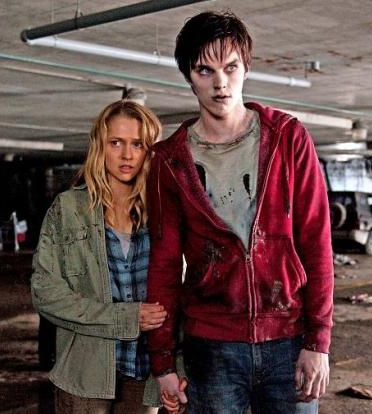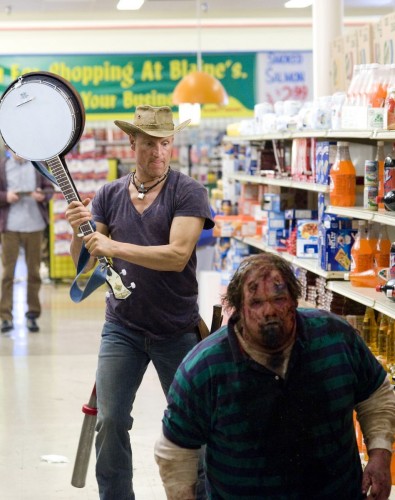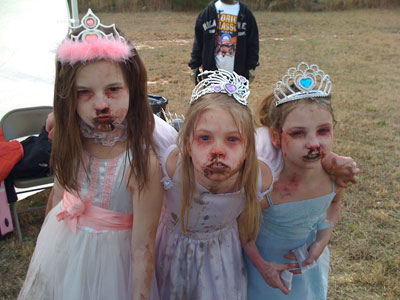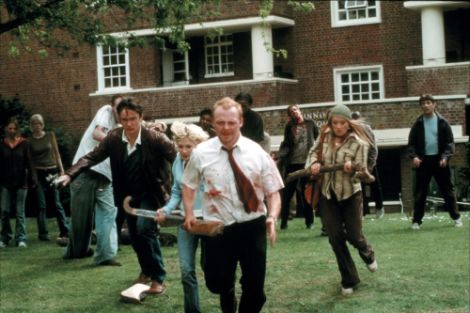
Today’s fantastic post on the living dead (spoiler: everyone) comes from Andrew Byers with Ben DeSpain:
 Zombies. They are everywhere, and coming to a theater near you.
Zombies. They are everywhere, and coming to a theater near you.
Pop culture today seems fascinated with the living dead. But it’s not necessarily the voodoo version of the zombie that so excites our imaginations. The 21st century zombie is more sophisticated, a product of some biological disaster, a viral scourge that turns normal folks into plastic-eyed, flesh-eating monstrosities. And in our populist eschatology there looms on the horizon a forthcoming “Zombie Apocalypse.” The dead will rise, and it will not be pretty.
Zombies are trending… so what are we to make of them? The zombie craze is perpetuated in part by our curious delight in cinematic gore. And perhaps zombie movies fuel our unhealthy means of coping with darkness and sinister forces by compartmentalizing evil, wrapping it up in a walking corpse easily smashed and eliminated.
Some zombie mythologies, however, are richly complex and even offer opportunities for theological thinking.
Oversimplifying Evil
But first, how do the shallower zombie narratives help us cope unhealthily with the threats of death, disease, and spiritual darkness?
A zombie embodies depersonalized evil. And depersonalized evil is easy to deal with.
Think about it: when a zombie comes at you groaning for the taste of your flesh with unblinking eyes, you wouldn’t think twice about bashing it in the head with a banjo (like Woody Harrelson’s character, Tallahassee, in Zombieland). No moral qualms about violence present themselves—not only are you resorting to self-defense, but also you are defending yourself against a non-person.
Orcs, battle droids, hideous aliens, and moaning zombies are easily identified as evil, and the big screen has taught us what to do with them: shoot, slash, bash or blast. And who could accuse us of being unjustly violent in such a scenario?
But the actual presence of evil in our society is much more complex. As the old preacher observed about Robert Duvall’s sketchy character in Aaron Schneider’s Get Low, evil and goodness are not easily disentangled. The Christian understanding of humanity is that although we are sinful, we have been fashioned in the image of God. And simplifying evil does not work so smoothly in real life.
 As quintessential stars in the horror genre, zombies are terrifying. But perhaps more horrendous is the fact that evil tends to linger in all of us, penetrating our personal motives and infiltrating our societal structures. Intertwined and intermixed with evil is a lot of goodness and beauty. When we hear of some incredulously vicious act—like a school shooting, a public bombing, or the sexual enslavement of three innocent girls—we almost wish the perpetrators were snarling beasts, drooling aliens, or groaning zombies… or at least mentally insane. It would justify our desire to distance evil from our humanity.
As quintessential stars in the horror genre, zombies are terrifying. But perhaps more horrendous is the fact that evil tends to linger in all of us, penetrating our personal motives and infiltrating our societal structures. Intertwined and intermixed with evil is a lot of goodness and beauty. When we hear of some incredulously vicious act—like a school shooting, a public bombing, or the sexual enslavement of three innocent girls—we almost wish the perpetrators were snarling beasts, drooling aliens, or groaning zombies… or at least mentally insane. It would justify our desire to distance evil from our humanity.
Yet most of the time, the perpetrators of evil look like the folks next door. They look like me (and you).
Zombifying our Enemies
This oversimplification of evil naturally leads to the “zombification” of our enemies. We are not referring to the voodoo ritual of rendering a hapless victim catatonic and obedient to our twisted will (though a ban on this sort of “zombification” is actually in Haiti’s legal code). The sort of zombification we have in mind is willfully forgetting the humanity of someone who’s against us. You know how it goes – the detested coworker, the girlfriend who cheated on us, or the people group threatening our national interests… we tend to view them one-dimensionally, to zombify them. And then the plan of action is quite simple to formulate. You defend and attack.
Likewise, the zombie threat is easy to deal with: you bludgeon or pull the trigger. In this sense, zombies are morally convenient.
But since we are dealing with evil that is embedded within divine image-bearers, we are faced with the difficult (impossible?) task of discerning between good and evil in the face of moral complexities.
Now, “bad guys” may well be “bad.” They may also have little kids, grandmas, and heartrending backstories of pain and personal abandonment. The moral convenience of zombies allows us to attack and destroy evil without ethical qualms. Zombifying the “bad guys” strips the humanity from our antagonists and reduces them to monstrosities in need of violent (and guiltless) elimination.
This does not mean that we should ignore evil in other humans. In fact, King David sounds as though he is facing a zombie attack when he writes of “evildoers” who “assail me to eat up my flesh, my adversaries and foes” (Ps. 27:2, esv). There may indeed be times when human beings behave like barely more than orcs, goblins, or zombies.
But David himself was called “bloodthirsty” (2 Sam 16:7–8), and he was painfully aware that evil pulsed in his own veins (Ps 51).
Zombie-Theology: When the Dead remind us that we are Dead… and in Need of Flesh and Blood
Amidst all the thrills and gore so endemic to the zombie genre are some profound statements about anthropology and theology.
In Max Brooks’ novel Word War Z (which will differ substantially from the forthcoming cinematic version), the zombie apocalypse provides a crisis for portraying the entangled darkness and beauty of human beings. The interviews compiled to form Brooks’ “Oral History of the Zombie War” bring out noble acts of heroism.
Those interviews also force evil to wear a human face, and not just a zombie mask. Brooks’ zombies are predictably depersonalized and horrifying, but they are minimized within his accounts and reduced to a menacing inhuman backdrop for depicting humanity. With eerie irony, the inhuman threat compels surviving humans to regularly turn on one another… even at times to the point of zombie-like cannibalism.
 The more sophisticated zombie stories, perhaps none more advanced than AMC’s The Walking Dead, use the groaning horror of dehumanized evil to show that we can identify with the living dead more than we would care to admit.
The more sophisticated zombie stories, perhaps none more advanced than AMC’s The Walking Dead, use the groaning horror of dehumanized evil to show that we can identify with the living dead more than we would care to admit.
The Bible and our Christian theological traditions actually tell a similar tale. Though biologically functioning, many of us are spiritually dead, groaning in the dark with a creation poisoned by evil (Rom 8:22–23). Hungry for flesh, and drunk with bloodlust, we assail one another in a daily grind of parasitic pursuits. Paul had to warn the Galatians, “But if you bite and devour one another, watch out that you are not consumed by one another” (Gal 5:15). The rubric “living dead” is a powerful metaphor depicting a humanity misshapen by sin.
And so our only hope is reanimation. Fictional zombies have clambered up out of tombs and morgues. Yet the Christian faith promises nothing less for those of us groaning and stumbling about as the living dead. At the “Christ Apocalypse,” there will be a reanimation of the dead into new life:
“Whoever feeds on my flesh and drinks my blood has eternal life, and I will raise him up on the last day” (Jn 6:54).
Come zombies, one and all. A table of true food and true drink awaits.
Andrew Byers is a PhD candidate in New Testament at Durham University where he serves as Chaplain at St Mary’s College. He writes forwww.BigBible.org.uk, blogs at www.hopefulrealism.com, and his books are Faith Without Illusions: Following Jesus as a Cynic-Saint (IVP, 2011) and TheoMedia: The Media of God and the Digital Age (Cascade Books, forthcoming). Ben DeSpain is a PhD candidate at Durhman University in Philosophical Theology. His research has focused on patristic and medieval theology.
[youtube=http://www.youtube.com/watch?feature=player_detailpage&v=6Ejga4kJUts&w=600]

COMMENTS
3 responses to “Religion and Zombifixation: In Need of Flesh and Blood”
Leave a Reply














Well done Andy. . .now tackle the obsession with Vampires. . .interesting intersection there as well with Christ and eternal life.